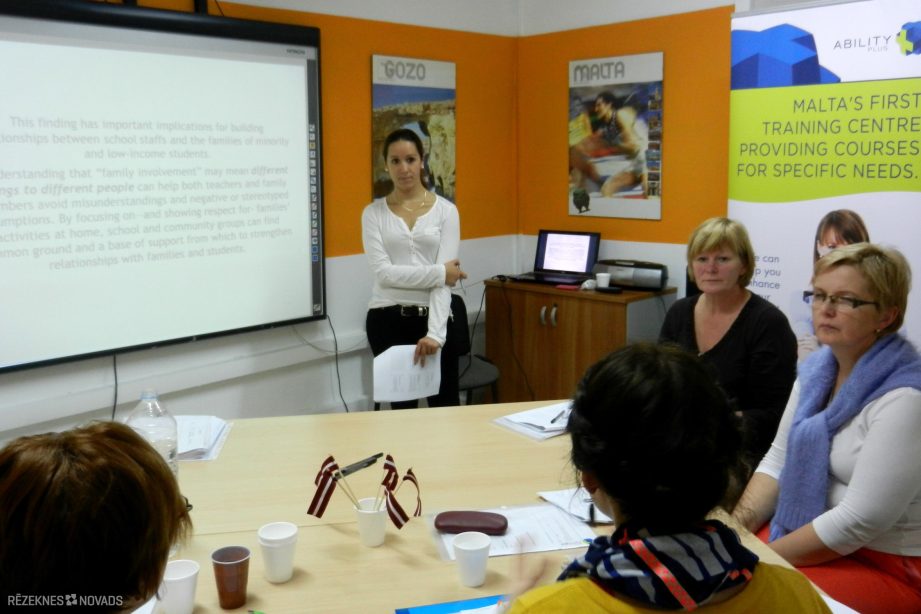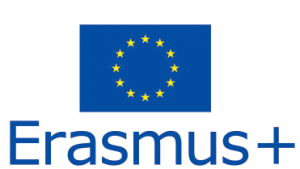“Embrace for the future” — Support system for parents

One of the keys to the world's familiarisation process is the addition of education and knowledge abroad, which opens doors to new impressions, emotions and knowledge. As of October 2014, the Rēzekne municipality has been implementing THE ERASMUS + programme 1 st Basic Activity Adult Education Sector Project “embracing the future”. Its aim is to prepare a team of adult educators for the development of parental training programmes and to lay the foundations for the development of the support system of parents, particularly from social risk groups. The main activities planned within the framework of the project are: mobility to four countries (Great Britain, Malta, Estonia, Italy), development of three training programmes for parents, preparation and publication of three videos in the information portal of Rezekne, organisation of educational seminars and preparation and distribution of calendar families.
The first mobility took place as early as the autumn of 2014, when a team of 5 people went to Maltas in the Mediterranean. The content of the Easy School (Malta) training programme “Support for families from social risk groups” was devoted to the emotional education and positive discipline of children, which is how to encourage, provide support by offering realistic techniques, to respond positively to various complex situations in children's education:
• cope with the unacceptable behaviour of children and address behavioural problems without violence;
• talk to children in such a way as to listen to them;
• constructively address family conflicts;
• encourage children to cooperate and strengthen their confidence in themselves;
• raise the sense of responsibility, autonomy, etc.
Overall, the training programme prompted people to think about how to teach parents to better understand their children and themselves in an older role, how to make parents aware of their positive resources and learn to use them. A very topical problem that led to the idea of lecturing Natasha Coppini in modern society is that parents often fail to regulate their emotions and therefore do not contribute to the development of emotion self-regulation in their children.
The learners of the training programme targeted us, the employees involved in the project, to establish the basic principles of the guidelines of the programmes to be offered to parents and the ability to see in advance the risks to which such programmes could be confronted.
On the basis of the lessons learnt from Easy School's training, it can be said that they must start with themselves and learn all, both together and separately, that is, - adult educators must learn how to talk to parents, so that they can be motivated to get involved; teachers have to learn how to deal with the problems and talk to parents in order not to call the pretrepreneurship; learn parents - how to be good parents, etc.
Aija Dundure, Minister for the Protection of Children's Rights of Education, says: "I am pleased with the possibility of learning the education programme of parents as professional and knowledgeable teachers. Although the training was quite intense, the time passed and interesting. The course program helped remember familiar things and learn new ones, as well as improve English knowledge. Thank you, Natasha, her lessons were always brilliant and prepared. Thank her for patience and always sparkling positivism.
It is positive that training took place in a small group, allowing teachers to focus more on each student, encouraging discussion, expressing opinions and finding a common solution. We have received rich knowledge. '
A team of 3 specialists went to Portsmouth in November. Within the framework of mobility, the Portsmouth College, the Support (Legal Advice) Centre, as well as the workshops, were presented with THE work of THE SWIG group and school support staff.
The main examples of positive practices to be found in Portsmouth are:
• Schools are offered lessons for parents, during which both educational programmes and creative workshops are being carried out and organise shared and meaningful leisure.
• The parents have access to free legal advice.
• Educational institutions are given the opportunity to invite a specialist in a couple of months to discuss any topic cared for parents.
in children, self-esteem is created and the “carrot method” is often used, i.e. the success is rewarded.
• The methodological advice on family rearing is based on parents' wishes and experience.
by expanding communication opportunities with parents, anonymous mail is created in many places where parents can leave notes with their question/problem/suggestion and support professionals try to respond to these things.
• Schools are accompanied by a teacher's assistant, who helps children with learning disabilities and children who are learning special educational programmes.
• all support services and educational institutions cooperate to preserve the family as a unit in which parents are responsible for raising their children.
The “hub for the future” project will continue until May 2016, so the list of work to be performed and the activities to be organised is still very large. The project adult learners group has undertaken work on sketching training programmes, but fully these programmes will be developed at the end of 2015 - at the beginning of 2016, when they will also be able to add lessons that will be achieved in the remaining two mobility.
Iveta bridge
co-ordinator of the project “hub”
“Hug for the future”
Contract No 2014-1-LV01-KA104-000218
